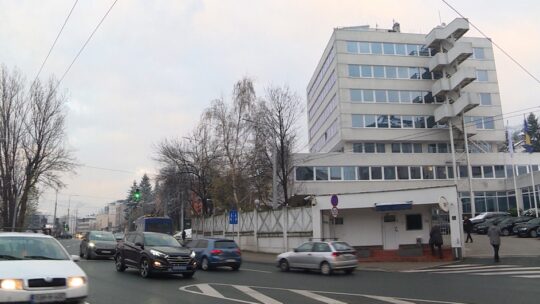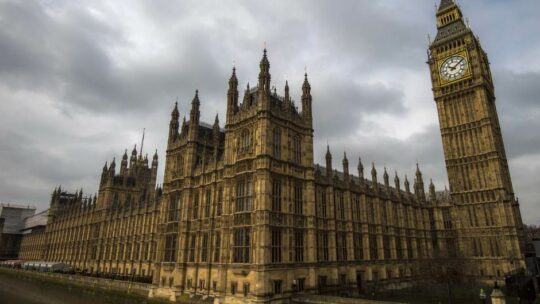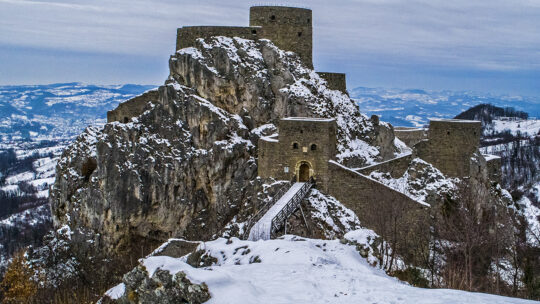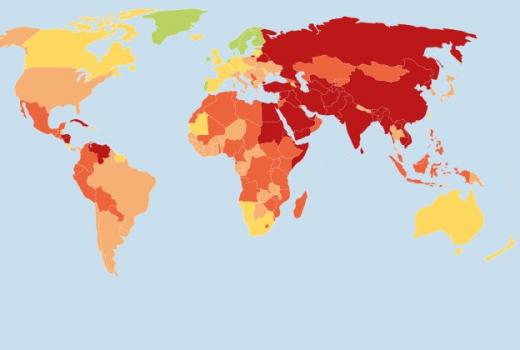
What is the role of philosophy in today’s world and all the challenges it brings? In N1’s ongoing series “World in Times of Corona”, foreign affairs editor Ivana Dragicevic spoke to Ukrainian political philosopher, dr Mikhail Minakov. Minakov, author of “Demodernisation: A Future in the Past,” and “Development and Dystopia,” is an associate at the Woodrow Wilson Centre’s Keenan Institute and a guest lecturer at a number of universities around Europe and the world.
You’ve been in Milan for two months now – you’re living there, teaching there – how has the life there been?
It’s a very strange, surreal situation to be stuck in an apartment for two weeks. We live in an apartment in the city centre and for two weeks, we basically stayed home, only going out once a week to buy food but that was basically it. Since delivery was disappearing, it has become a very interesting period, when you were a hunter. You go out, you stand in this long line with two meters in between people. But it was doable and, in a way, the citizens of Milan were behaving in a very supportive way to each other, with respect, solidarity, and these concerts were very touching.

The world is now moving in the other direction, even though we still don’t have the vaccine and no one knows how the virus is going to behave in the future. But, you mentioned solidarity, and also you spoke about this formulation – you were the hunters. The survival game that we went into during this pandemic is maybe something that is interesting from the standpoint of political philosophy of our century. How do you see humans behaving in this situation?
I think what we definitely witnessed, experienced in Europe, with quarantine being quite strict for a certain period, that we are going through the process that Giorgio Agamben, another political philosopher, described several years ago in terms of nude bodies. Instead of being a citizen, a human with inalienable rights, we suddenly turned into representatives of biological species. And here, this idea of biopolitics, of biopower, plays very well. Instead of people, we’re now population, instead of citizens we are nude bodies that are looking for survival as a fundamental and basic need. Immanuel Kant in one of his many lectures on ethics, has once described that human beings are intrinsically moral and free. However, in order to be able to be moral and free, you have to survive. Even someone as rigorous as Kant was willing to accept the biopolitical argument in the beginning. First, you survive and second, you act responsibly.
Talking about political philosophy of our time – before the corona crisis we basically lived in the world that become more and more multipolar, we had this fight between Washington and Beijing as the two biggest economies in the world. That narrative basically spilled over to the corona crisis. But, before this, something else was also happening. There were huge requests for a paradigm shift, people were calling for the green future and the change of philosophy of politics as we knew it. So where do we stand now in these terms?
It wasn’t that big of a change, it’s just that we are definitely entering the world where the living generations have to come up with new ideological solutions for political, social, economic problems. We have to take responsibility for the world we live in. Institutions don’t work, they don’t function well anymore. If you look at the most recent reports from the Varieties of Democracy database, which describes all political regimes around the globe since 1900. You definitely see that throughout 20th century, strong and efficient democracies and autocracies were developing. But then, something changed by the beginning of 21st century and both free and non-free regimes declined. Globally, we see a trend of more and more deficient democracies. Basically, political systems with pluralism without one core ideology. There is definitely empirical proof that there’s free space for us to come up with new solutions. Green ideology for example is a mixture of old liberal, socialist, sometimes even centrist, ideas, but they create something new in politics, a way of finding what is just, justice for the living, justice for the future generations. Also there is a boom of liberal conservatism, around at least the old democracies. It’s also a sign that either we will come up with good solutions or we will just disappear. You were talking about this global change. Right before the virus, there was a very important discussion at the Munich Security Forum where many people were talking about “westlessness”, the idea that these universal values, mainly promoted by the West-oriented organisations, have lost power. The question is, was that real universalism, was it really something for all of humanity, or was it all just Western ideology? We really will witness, and participate in, rethinking in how universal values should be working in this century.
How can we rethink the values and value-systems where we have several new options on the table? Where do we stand during this survival game where we all take on this biological meaning primarily? Do we then become tribalists, ultraconservatives, or do we choose some other way? Where can we go if either direction takes over?
As a political scholar, I know that predictions work badly. They try to determine our future, limit our freedom and creativity. I come up with choices that we should make this year. In political philosophy, in social theory and in real politics, there is a debate right now between those who say the future is the future of crises and only authoritarian systems can respond to them in the best way. That’s where this propaganda comes from of Chinese values, of Chinese response for example. There’s another strong message from the so-called technocratic regimes like Japan or South Korea that showed a very rational way of dealing with the virus, and there, the constitutional rights, human rights, were not violated very much. These regimes and systems are not very democratic either, they are very conservative. So maybe this conservative term will have a place. But, in my recent publication where I tried to logically describe what these options are, I came up with a biopolitical trilemma which describes the choice between the interests of sovereign states, between us as a biological population in certain areas and human beings called citizens, with rights and freedoms. Between these three major elements of choice, we can choose only a compromise between two. One will always be left out. If we take seriously the interests of population and sovereign states, then we come up with illiberal sovereignties, which is a very conservative trend that has started well before the virus. It’s actually Putinism – from Putinism to Trumpism, we have different faces of these sovereignties, also with Orban – but in all our countries we see political forces and figures that promote this idea. The pandemic will definitely enforce this choice. But there is another type of choice. The choice of democracy. Here, sovereign states and citizens will try to cooperate. Over the last 50-70 years we have created a lot of strong, democratic institutions. They will probably try and stop us from finding new solutions for new pandemics or new economic crises. And then the population will continue to decrease. We may have depopulating democracies. The third choice, between citizens and population – majority of contemporary governments around the globe are dysfunctional. These regimes show an inability to fight Covid, or corruption, or change of geopolitical waves, or economic crises. But then, individual citizens and local groups will start looking for new political solutions for the crises. Here comes the era and the choice of anarchy, the strange decentralising anarchy that provides transnational and subnational actors with an opportunity to go on. And suddenly you see that the economic crisis and the epidemic, which come together, they force us to choose soon, to come up with solutions. These choices will most probably predict the development of our societies, governments, states for the next 20-30 years.
This concept of a trilemma reminded me of Dani Rodrik’s trilemma of globalisation. An important discussion was also happening about globalisation before the pandemic. We now see some consequences on travel, we are rethinking whether China will still remain this production hub of the world. How may these options you say we have on the table influence this huge machine that’s been pumping the world during all these years?
Most probably this “westlessness”, this shift of the centre of global power to Asia, mainly China, will create a situation where this enlightened authoritarian model will be promoted around the globe. It’s not new. If you look at the beginning of 1980s, socialist model, also very authoritarian, was also spreading around the globe. 1984 was the year when regimes orienting around the socialist authoritarian model were very popular globally. Now, the Chinese model may be promoted. Basically, it’s the corporate state, capitalism with minimal rights for the citizens, but promotes a certain level of income for the households. So, economic and biopolitical rights may be offered to people to make this choice in favour of illiberal sovereignty, but of course, political freedoms are in danger and I am sceptical about the increases of political freedoms in the world. This third way is the past and now many colleagues in political science and political philosophy talk about the third way of authoritarianism. Here, China comes as a power that offers political, socio-economic model, but also promotes a certain geopolitical choice, and it’s here. What IMF and the World Bank are showing, these huge decreases in GDP globally will be recovered already next year. However, the major driver behind this recovery will be China, so the world is becoming economically dependent on Chinese economy.
Talking about models and ideas for the future, one of them became more vocal during this crisis. It’s based on what we call UN Millennial goals and global gender equality. The concept being promoted is one of women leaders and new understanding of politics through empathy, through authenticity – not directly through gender, but instead this structure. People are talking about New Zealand, whose Prime Minister, Jacinda Ardern, before the crisis constructed a new way of creating a state budget, which would centre around wellbeing. I think human security will become more of a topic than national security in the world, do you think that this concept is something that we also have to think about?
Yes, absolutely. However, the value of biopower and biopolitics will be very hostile to this type of idea and political practice. It comes down to human security, but usually securitisation means more disciplined societies with less freedoms. Sovereignty, as a conservative choice, is also very hostile to gender ideology. Even in the most free post-communist, post-soviet countries, you can see how our societies can join around the conservative agenda. In Ukraine, after Zelensky, there was hope that coservatives were gone and that in 2018 we got a new generation of politicians. What they did last March, they signed a common agreement in defence of family values. Usually, this “family values” is a surrogate name for a very conservative agenda. So, even the new generation, which was very anarchic, can easily join the conglomerates of political power around the conservative agenda. The biopolitics is especially toxic for gender equality and for the rights of women, because women, the female body, is usually the object of control of all the illiberal, conservative political machines. Reproduction, more children, a ban on abortion, controlled behaviour, the conservative idea of family, it all becomes a pinnacle of society. Men’s bodies will also be controlled, but less so – mainly the gay community will be repressed. But, here, this idea, globally, that women should be more controlled, will have more of a future then the, let’s call it, Australian political practice.
You’ve already mentioned the cases in Europe, Poland and Hungary. Russia is our big Eastern neighbour, there is a huge conservative movement in the USA. But, as we are now moving towards our part of the world, Eastern Europe, does emancipation still have power, and how much, in Eastern societies? Whether they are members of the EU or not.
It looks like, even though you create a very strong infrastructure, ideologically, Europe is much more united, and that includes Eastern Europe – southern Caucasus, Belarus, Ukraine, Moldova, and six unrecognised states. This diversity of Europe still creates some invisible infrastructure. This infrastructure is based on ideological competition between many different ideas. We already talked about sovereignism and illiberal turn. In 2018 Freedom House made a report about this illiberal turn in Eastern Europe. Looking at the east, we see a very strange map. In central Eastern Europe, including Balkan countries, we have illiberalism. It goes from Tallinn today, to Sofia. If we look more to the east, there is authoritarianism, from Moscow and Minsk, to Ankara. And there are oscillating countries that are free, pluralist, but the quality of democracy is very low. Georgia, Moldova, Ukraine, Armenia. But then, if we change the scope from assessing political regimes and look at the socio-economic element, it looks like autocracies offer their citizens better economic conditions. Wellbeing without human security. Wellbeing without civic dignity. This is Minsk, Putin, Kaczynski, and this is Orban. They are very good at using this socio-economic argument and also, of course, ethnic divisive policies. I think our future in Eastern Europe is connected to this very strong de-modernisation trend, losing emancipation. The new generation of people were subject to an education of ideological indoctrination over the last 20 years. In many ways, the captive mind that Czeslaw Milosz was talking about 30-40 years ago, maybe more, he was talking about the socialist mind. Now, we are talking about the ethno-nationalist mind. I am not sure if this new generation that is now entering politics is able to promote individual emancipation. Their scope, their vision, is too connected to the ethno-collective values. And here comes the issue that the green movements, the new socialist liberal movements will have to deal with. Maybe education, institutes of national memory, are the subjects of taking over by the liberals and the socialists.
Talking about Eastern Europe, we must talk about Russia. Covid-19 is spreading quickly there, we saw the other day 10,000 new cases, but at the same time the EU was very strong in emphasising that even at this time of a pandemic, Russia is still continuing with its misinformation campaign, its influence in Europe along with China. How do you think this relationship will evolve? Before the crisis, we saw the constitutional changes in Russia that Putin proposed. You’ve been working on the subject of Russia for a long time, so what are your ideas about this process?
If you look at the situation in Russia, Putin was prepared to start the transition period when the new leader would take over. Of course, it’s a matter of next five to seven years, but critical decisions were being prepared. If the constitutional change had taken place as was planned, by now Putin would be even better-positioned to control this transition of power. Now, this transition is delayed. Putin, whose regime was using artificial crisis, that he created himself – Ukraine, Syria – he was adding to his image of the potential master of the fate of Russia, but also globally. Right now, his image is shrinking in a way. Of course, he’s still very popular, but his support has dropped to closer to 50 percent, which is unusually low for him. He also showed that his regime was unable to react properly to a crisis that was not prepared by him. It’s very vulnerable, even though this authoritarianism that he created is called smart, or intelligent, authoritarianism, right now Russia is in a period where the regime showed its weaknesses and the local governments looked much more effective in protecting populations than Moscow. So it’s an interesting disbalance. Also, Moscow, where the epidemic is now concentrated, will stay in quarantine longer, while the rest of Russia is moving into the soft quarantine. This morning, there was a report that Russia has reached the plateau, plus the mortality rate in the country is very low. So, in a way, it looks like Putin survived this, but the regime has a lot of vulnerabilities and this constitutional change may either be delayed or forgotten.
Talking about the relations between EU, Nato, and Russia in this context was also linked to his policies exercised since 2008 – Georgia, annexation of Crimea, situation in Donbass, Luhansk. Even though the subject of Ukraine disappeared from the front pages, it’s still there. The Minsk process is still going on. Can you just update us on where we stand?
The conflict is ongoing; it’s a low-intensity military conflict, meaning that there’s 10-20 people killed on the front lines in Donbass. This conflict is still ongoing even in the period of epidemic. The activities are probably slowed down – in recent four to six weeks, there have been 5-10 attacks a day, rather than 20-30 like before. However, when Zelensky became President, the Minsk process returned to its full force. There have been several swaps of prisoners of war, the last one was four weeks ago, which shows that talks are continuing. But the pullback, a very interesting initiative that had a lot of perspective, proposing that forces would pull back, the grey zone would be longer, and the number of killed or wounded would be diminished. So far, the pullbacks were done in only three zones, and since then, the front line is a very complex and difficult issue – when you have only several zones with pullbacks, it creates a number of vulnerabilities in both armies which intensifies the attacks.
I was in Kiev just before the coronavirus crisis started and, for me, it was striking how the international community stopped talking about it. You are on the European continent. You have this secessionist movement that was established there and from my perspective it was irrational to see that and to understand how this is going to finish in the end. Crimea seems to be a done deal – Putin built a bridge, the authorities are established, it’s a part of Russia – even though the entire international community is not recognising it. What will be the endgame here?
There are too many factors that make an impact, predictions don’t work here. So far, there is political will in Europe to at least freeze the war and return to a diplomatic solution. However, I must say that the media politics, or the political issues discussed in the European or the western media, they basically forgot about Crimea and Donbass. If you look at the real political process, however, they are there. There are still talks in Brussels, Paris, Berlin, Kiev, Moscow… all are involved in the talks and looking for certain solutions. It’s getting better, it’s getting worse; there was a period of stronger cooperation, now the talks seem to be frozen again. And then, in Kiev there is a new team coming into the trilateral Minsk group which does create hope that at least the military part will be frozen in time, maybe this year. But you’re right, discussion about the Crimea is gone even from the political conversation. Right now, the military issue is the major one. There’s also an interesting process going on in terms of assessing what’s going on in Crimea. There is a lot of disinformation from many different parts and when scholars tried to make assessments, they became the object of political pressure from diplomats, from governments, who are all saying “don’t go there, we politicians know better what’s going on.” That’s also the case. It doesn’t serve well in the long term. Right now we just have to agree that there are a number of threats to common European future – one of them is the militarisation of Eastern Europe. In the recent ten years, especially since the beginning of the Donbass war, investment in our armies was huge, and there was no investment in big diplomatic, or security network. We invest a lot in armies, but we do not invest in political and diplomatic solutions which creates the infrastructure for future war in the area. The other big tendency here is the spread of secessionism. In the recent 30 years, we ended up with six new states in Eastern Europe, with more than 4 million Europeans living in those states. Thousands and thousands of young and middle-age activists from western European nations have gone through these conflicts, they learned how to organise these de-facto states, how to organise guerrilla, so this political action and ideology is spreading. Europe should not stay blind.
You, as a prominent political philosopher, started something which I find very interesting and we talked about it a lot – the importance of philosophy in today’s world. You mentioned that we are rethinking our political philosophies. You founded one platform for Eastern European philosophers to share their ideas. How important do you think philosophy is in today’s world?
Philosophers, their community, are the subject of repression and ideological control. After communism, there was a period where everybody thought that philosophy had lost its importance, especially its ideological value, but now philosophers can be free. However, over the past 15-20 years, political regimes in Eastern Europe re-launched the control over the way philosophers think and talk. All the centres, university centres, academic centres of philosophy, are under very strong institutional control, either corrupt or nationalist conservative forces. In the last 10 years, I made my own analysis of PhD theses of philosophers – I do it every ten years – and I saw that this conservative trend was huge. Basically these official structures of philosophy between Tel Aviv and Tallinn, including Moscow, Warsaw, and other parts of Eastern Europe, are under very strong institutional control of conservatives. So, instead, there was a group of younger and older philosophers, who came together to have their own columns, very short texts. For a philosopher to write a 500-word text, it’s torture. But we agree that if we want to talk to each other, to wider communities, we need to stay limited in the number of words. We started a small community back in November, but right now there is tremendous interest in the region, and we have more and more participants who share left, liberal, green ideas, who promote their agendas. It looks like this brings some fresh air into the world. Lithuanian philosopher and dissident Tomas Venclova wrote in 2006, “there is no air, I cannot breathe anymore.” He was talking about Lithuania, but there is a lack of air, fresh ideas, throughout Eastern Europe. We are trying to deal with this. We cannot stay away from de-modernisation happening in our own community.
You talked, and wrote, a lot about the process of de-modernisation. This quote about needing fresh air is maybe a very good point for the end. Thinking about all this, do you think that we also, as the world, need some kind of a new language?
Yes, I think philosophers, social thinkers, are coming up with it. It’s interesting that the economic crisis and the pandemic, has forced philosophers and social thinkers to leave their ivory towers and try to find common language between themselves and among the nations.




